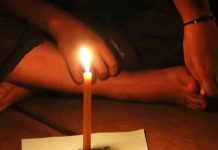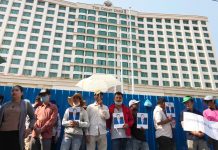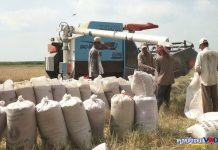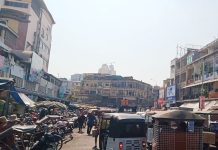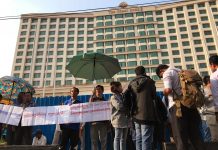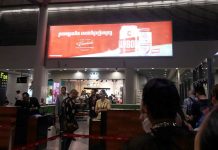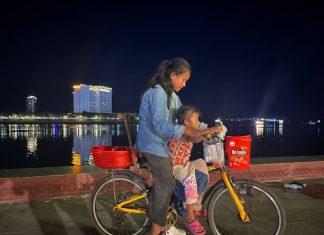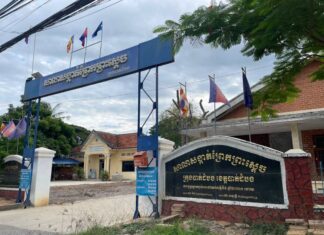ការចុះអនុវត្ដន៍នៅខាងក្រៅ មិនងាយស្រួលដូចការរៀនទ្រឹស្ដីនៅក្នុងថ្នាក់
ក្នុងសប្ដាហ៍ទី៥នេះ ខ្ញុំបានទទួលការពន្យល់យ៉ាងក្បោះក្បាយពីលោកគ្រូខ្មែរ និងបរទេសទាក់ទង និងការសរសេរព័ត៌មាន និងការបែងចែកព័ត៌មានរវាងការសរសេរ Break News និង Feature។
The Football Superstar Who Wasn’t
It is almost two months now of me living with the Cambodian Center for Independent Media (CCIM) and Newsroom Cambodia Group II trainees, especially with all my trainers.
Can You See Your Eyes Without a Mirror?
Dreams are invisible. They don’t exist, but dreams might come true during hard times.
The Relationship Between Soul and Time
What would you do if a genie gave you three wishes?
Women Journalists Defy Stereotypes of the Work as Too Dangerous, ‘Not Suitable’
Cheng Sokhorng has been discouraged from pursuing her career in journalism, both at home and at work.
អតីតបុគ្គលិកសណ្ឋាគារ The Great Duke ជួបបញ្ហាជីវភាព ហើយបន្តទាមទារសំណង
អតីតបុគ្គលិកបម្រើការនៅសណ្ឋាគារ The Great Duke ដែលប្តូរឈ្មោះពី InterContinental នៅតែបន្តធ្វើការតវ៉ា នៅមុខសណ្ឋាគារ ដោយសារពុំទាន់ទទួលបាន ដំណោះស្រាយ ហើយការពន្យារពេលនេះ វាធ្វើឲ្យប៉ះពាល់ ដល់ជីវភាពរស់នៅ ប្រចាំថ្ងៃរបស់ពួកគេយ៉ាងខ្លាំង។
My First Individual Article
For week five, everyone has started to write individual articles. Finding a topic is hard, but finding an angle is harder.
តម្លៃស្រូវនៅខេត្តតាកែវ និងខេត្តព្រៃវែងនៅតែប្រែប្រួលតាមមាត់ឈ្មួញវៀតណាម
ប្រជាកសិករ និងឈ្មួញមួយចំនួននៅខេត្តតាកែវ និងខេត្តព្រៃវែង លើកឡើងពីការលំបាករបស់ពួកគាត់ថា តម្លៃស្រូវប្រែប្រួលទៅតាមមាត់របស់ឈ្មួញវៀតណាម ធ្វើឱ្យពួកគាត់ខាតបង់ទាំងអ្នកដាំដុះ និងអ្នកទិញយកទៅលក់បន្ត។
ប្រជាពលរដ្ឋស្នើឲ្យអាជ្ញាធររៀបចំសណ្តាប់ធ្នាប់ជុំវិញផ្សារអូរឫស្សី
អ្នកធ្វើដំណើរ និងអតិថិជន ត្អូញត្អែរ ការកកស្ទះចរាចរណ៍ជុំវិញ ផ្សារអូរឫស្សី ដែលបង្កឡើង ដោយយានយន្ត ចតគ្មានសណ្តាប់ធ្នាប់ និងអាជីវករ មួយចំនួន លក់ដូរលើចិញ្ចើមផ្លូវ។
សហជីព និងអង្គការសង្គមស៊ីវិល៧៨ ស្នើឲ្យរដ្ឋាភិបាលពង្រឹងច្បាប់ស្តីពីសំណង់ ក្រោយមានករណីបាក់អគារបន្តបន្ទាប់
សហជីព និងអង្គការសង្គមស៊ីវិលចំនួន៧៨ បានដាក់ញត្តិរួមគ្នាទៅក្រសួងការងារ និងក្រសួងរៀបចំដែនដី ដើម្បីជំរុញឲ្យ មានការអនុវត្តច្បាប់ស្ដីអំពីសំណង់ ឲ្យមានប្រសិទ្ធភាពនៅ ក្នុងប្រទេសកម្ពុជា។
អតីតបុគ្គលិកសណ្ឋាគារផ្កាយប្រាំ The Great Duke តវ៉ាទាមទារ ប្រាក់អត្ថប្រយោជន៍
អតីតបុគ្គលិក សណ្ឋាគារ The Great Duke ជាង១០០នាក់ បានប្រមូលផ្តុំតវ៉ា នៅមុខសណ្ឋាគារ នៅព្រឹកនេះ ដើម្បីទាមទារ ប្រាក់អត្ថប្រយោជន៍ និងសំណងផ្សេងៗ បន្ទាប់ពីបរាជ័យក្នុងការចរចា។
The Art of Making a Mistake and Learning From It
If I could earn money every single time I listened to my inner voice, I would maybe compete with Bill Gates’ net worth.
បទពិសោធន៍ ក្នុងការទំនាក់ទំនង ជាមួយមនុស្ស ដែលមានឋានៈធំៗ
ក្នុងសប្តាហ៍ទី៥នេះ អ្វីដែលខ្ញុំទទួលបានពីវគ្គបណ្តុះបណ្តាលនេះគឺការចេះគិតច្រើនជាងមុន។ កាលពីមុនខ្ញុំមិនទាន់ច្បាស់រឿងអ្វីទៅជាពត៌មាន។
Making the Impossible Possible
As I work through my resolutions for the 2020s, I’m facing many situations that pull me out of my comfort zone. I have three short mysteries to share with you.
ខ្ញុំជាមួយនឹងNEWSROOM CAMBODIA
នេះជាសប្ដាហ៍ទី៥ហើយ ដែលខ្ញុំបានចូលរួម ជាមួយវគ្គបណ្ដុះបណ្ដាល អ្នកសរសេរសារព័ត៌មានរបស់មជ្ឍមណ្ឌលកម្ពុជា ដើម្បីប្រព័ន្ធផ្សព្វផ្សាយឯករាជ្យ(CCIM)។
An Unexpected Issue at the Phnom Penh Court
Early morning on Wednesday, January 15, when I woke up, I thought, “YES…”




